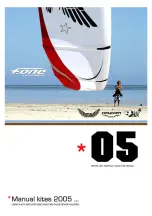
Quik & Quik GT450 Aircraft Operating Instructions
29
th
March 2007
Issue 1
Page 3 of 68
10.5.
Centre of Gravity
48
11. Structures and Systems
50
11.1.
Primary Structures and Systems - The Wing
50
11.2.
Primary Structures and Systems - The Trike
51
11.3.
Secondary Structures and Systems - Engine Controls
53
11.4.
Secondary Structures and Systems - Braking System
54
11.5.
Secondary Structures and Systems - Fuel System
54
11.6.
Secondary Structures and Systems - Seat Belts
55
11.7.
Secondary Structures and Systems - Cockpit and Fairing
55
11.8.
Secondary Structures and Systems - Electrical System
55
11.9.
Secondary Structures and Systems - Carburettor Heat
55
11.10.
Secondary Structures and Systems - Radiator Covers
56
11.11
Secondary Structures and Systems – Trim System
56
12. General Information
58
12.1.
Running Gear
58
12.2
Placards, Decals and Locations
58
12.3.
Electrical System Specification
58
13. Rigging the Aircraft
60
13.1.
General
60
13.2.
Wing Rigging
60
13.3.
Preparing the Trike
64
13.4.
Connecting the Wing to the Trike
64
14. De-Rigging the Aircraft
67
14.1.
De-Rigging
67
14.2.
Rigged Wing Storage
68
14.3.
Wing Overnight Parking
68




































